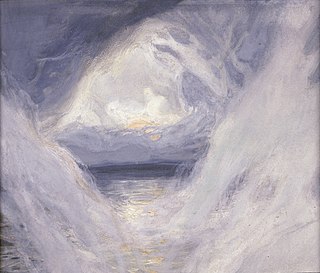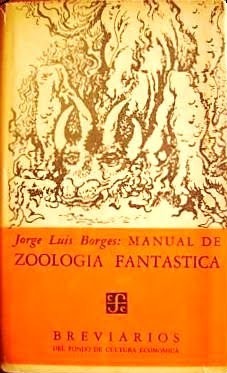Related Research Articles

Jorge Francisco Isidoro Luis Borges Acevedo was an Argentine short-story writer, essayist, poet and translator regarded as a key figure in Spanish-language and international literature. His best-known works, Ficciones (transl. Fictions) and El Aleph, published in the 1940s, are collections of short stories exploring motifs such as dreams, labyrinths, chance, infinity, archives, mirrors, fictional writers and mythology. Borges's works have contributed to philosophical literature and the fantasy genre, and have had a major influence on the magic realist movement in 20th century Latin American literature.

The Omphalos hypothesis is one attempt to reconcile the scientific evidence that the Earth is billions of years old with a literal interpretation of the Genesis creation narrative, which implies that the Earth is only a few thousand years old. It is based on the religious belief that the universe was created by a divine being, within the past six to ten thousand years, and that the presence of objective, verifiable evidence that the universe is older than approximately ten millennia is due to the creator introducing false evidence that makes the universe appear significantly older.

The Quran, also romanized Qur'an or Koran, is the central religious text of Islam, believed by Muslims to be a revelation directly from God (Allāh). It is organized in 114 chapters which consist of individual verses. Besides its religious significance, it is widely regarded as the finest work in Arabic literature, and has significantly influenced the Arabic language. It is the object of a modern field of academic research known as Quranic studies.
"The Immortal" is a short story by Argentine writer Jorge Luis Borges, first published in February 1947, and later in the collection El Aleph in 1949. The story tells about a character who mistakenly achieves immortality and then, weary of a long life, struggles to lose it and writes an account of his experiences. The story consists of a quote, an introduction, five chapters, and a postscript. "The Immortal" has been described as "the culmination of Borges' art" by critic Ronald J. Christ.
"The Approach to Al-Mu'tasim" is a fantasy short story written in 1935 by Argentine writer Jorge Luis Borges. In his autobiographical essay, Borges wrote about "The Approach to Al-Mu'tasim", "it now seems to me to foreshadow and even to set the pattern for those tales that were somehow awaiting me, and upon which my reputation as a storyteller was to be based."

The Genesis creation narrative is the creation myth of both Judaism and Christianity. The narrative is made up of two stories, roughly equivalent to the first two chapters of the Book of Genesis. In the first, Elohim creates the heavens and the Earth in six days, then rests on, blesses, and sanctifies the seventh. In the second story God creates Adam, the first man, from dust and places him in the Garden of Eden. There he is given dominion over the animals. Eve, the first woman, is created from Adam's rib as his companion.

The Book of Imaginary Beings was written by Jorge Luis Borges with Margarita Guerrero and published in 1957 under the original Spanish title Manual de zoología fantástica. It contains descriptions of mythical beasts from folklore and literature. In 1967 the authors published an expanded edition retitled as El libro de los seres imaginarios. Borges collaborated on the first English translation, which was praised upon its publication in 1969.

Labyrinths is a collection of short stories and essays by Argentine writer and poet Jorge Luis Borges. It was translated into English, published soon after Borges won the International Publishers' Prize with Samuel Beckett.
In literature, psychological fiction is a narrative genre that emphasizes interior characterization and motivation to explore the spiritual, emotional, and mental lives of its characters. The mode of narration examines the reasons for the behaviours of the character, which propel the plot and explain the story. Psychological realism is achieved with deep explorations and explanations of the mental states of the character's inner person, usually through narrative modes such as stream of consciousness and flashbacks.
Lost in the Funhouse (1968) is a short story collection by American author John Barth. The postmodern stories are extremely self-conscious and self-reflexive, and are considered to exemplify metafiction.
"The House of Asterion" is a short story by Argentine writer Jorge Luis Borges. The story was first published in 1947 in the literary magazine Los Anales de Buenos Aires and republished in Borges's short story collection The Aleph in 1949. It is based on the Greek myth of Theseus and the Minotaur and is told from the perspective of Asterion, the Minotaur.
Celestial Emporium of Benevolent Knowledge is a fictitious taxonomy of animals described by the writer Jorge Luis Borges in his 1942 essay "The Analytical Language of John Wilkins".
Shem HaMephorash, meaning "the explicit name," was originally a Tannaitic term for the Tetragrammaton. In Kabbalah, it may refer to a name of God composed of either 4, 12, 22, 42, or 72 letters, the latter version being the most common.
"Three Versions of Judas" is a short story by Argentine writer and poet Jorge Luis Borges. It was included in Borges' anthology Ficciones, published in 1944. Like several other Borges stories, it is written in the form of a scholarly article. The story carries three footnotes and quotes many people, some of which are real, some have been concocted from real life and some are completely fictitious.
"Shakespeare's Memory" is a short story by Argentine writer Jorge Luis Borges originally published in 1983, in the book of the same name. This is one of Borges' last stories, but it differs little, both thematically and stylistically from the much earlier stories that made him famous.
"The Two Kings and the Two Labyrinths" is a short story by Argentine writer Jorge Luis Borges, first published in February 1936. It was later included in El Aleph under the title "Los dos reyes y los dos laberintos". It deals with a number of Borgesian themes: labyrinths, supposed obscure folk tales, Arabia, and Islam. The story is itself referenced in-universe by characters of Borges' "Ibn Hakkan Al-Bokhari—Dead in His Labyrinth", also found in The Aleph.

"Ulrikke" is a short story by Argentine writer Jorge Luis Borges, collected in the anthology The Book of Sand. It is notable because it is one of the few of Borges' stories in which women and sex play a central role.
"The Wait" is a 1950 short story by Argentine writer Jorge Luis Borges. It was published in the collection The Aleph. David Foster Wallace referred to the story as "marvelous".
"The Others" is a 1972 short story by Argentine writer Jorge Luis Borges (1901-1975), collected in the anthology The Book of Sand.
"The Theologians" is a short story by Argentine writer Jorge Luis Borges. It was featured in the collection Labyrinths. It was originally published in Los Annales de Buenos Aires in April 1947 and appears in the 1949 short story collection The Aleph.
References
- ↑ Williamson, Edwin (5 December 2013). The Cambridge Companion to Jorge Luis Borges. Cambridge University Press. p. 58. ISBN 978-1-107-72882-0 . Retrieved 4 July 2024.
- ↑ Cummings, Brian (2022). Bibliophobia: The End and the Beginning of the Book. Oxford University Press. p. 387. ISBN 978-0-19-284731-7 . Retrieved 4 July 2024.
- ↑ "A Summary and Analysis of Jorge Luis Borges' 'The God's Script'". Interesting Literature. 24 April 2023. Retrieved 4 July 2024.
- ↑ Scharm, Heike; Matta-Jara, Natalia (17 October 2017). Postnational Perspectives on Contemporary Hispanic Literature. University Press of Florida. p. 207. ISBN 978-0-8130-5201-4 . Retrieved 4 July 2024.